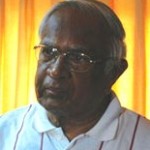On Hudson Protest Vs Nimalka Protest
 Recently a group of women professionals decided to protest against the abusive language used by the Chairman of the Rupavahini Corporation Mr.Hudson Samarasinghe against M/s Nimalka Fernando an active civil rights campaigner. They gathered outside the Rupavahini carrying posters. A counter demonstration had also been organized and they too gathered in the vicinity to hoot and jeer at them.
Recently a group of women professionals decided to protest against the abusive language used by the Chairman of the Rupavahini Corporation Mr.Hudson Samarasinghe against M/s Nimalka Fernando an active civil rights campaigner. They gathered outside the Rupavahini carrying posters. A counter demonstration had also been organized and they too gathered in the vicinity to hoot and jeer at them.
The Police were present in numbers and instead of telling them to lay off pushed the women protesters away to the road. They apparently to protect them, surrounded the women and shepherded them away from the scene. The Police did nothing to stop the counter demonstrators jeering.
Peaceful protest it is a vital part of a democratic society and has a very long and respected tradition in the democratic world. It can be a very powerful campaign tool against injustice and many of the rights and freedoms we enjoy today were gained because people were prepared to go out on the streets and protest.
The United Nations Charter is binding on all member states and we are a member state. . The Universal Declaration is a fundamental document of the United Nations. The declaration has served as the foundation for two binding UN human rights covenants, the International Covenant on Civil and Political Rights, and the International Covenant on Economic, Social and Cultural Rights and the principles of the Declaration are elaborated in international treaties such as the International Convention on the Elimination of All Forms of Racial Discrimination, the International Convention on the Elimination of Discrimination Against Women. In the Bangkok Declaration adopted by Ministers of Asian states meeting in 1993 Asian governments reaffirmed their commitment to the principles of the United Nations Charter and the Universal Declaration of Human Rights.
Public protest is deeply rooted in democratic political culture. There have been countless times in the past – even in the recent past – when public demonstrations of support for a cause, or opposition to a policy or government, have changed the course of history. ‘People power’ can be a potent political force, whether at a national or a local level; whether to do with political causes or single issues; whether in support of striking workers or bereaved families, or in opposition to globalization, or the waging of unjustified wars. When people have nothing else to fight with, it is often their solidarity with each other – to stand together and be counted which proves to be their most powerful weapon. These women could do nothing except to protest in the street to exercise their right against being abused by powerful personalities. Read More

